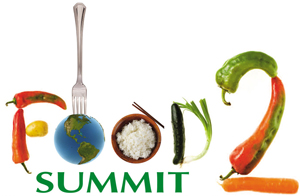Oct. 11 summit to draw researchers on food from across campus
Oct. 11 summit to draw researchers on food from across campus
Stanford researchers, scholars and local food activists are invited to Food Summit 2, a one-day symposium designed to unite people from all corners of the Stanford community who are interested in improving the quality of the food we produce, provide and consume. The symposium will take place 8 a.m. to 2 p.m. Oct. 11 at the Arrillaga Alumni Center, with a public forum to follow that evening at Memorial Auditorium.
Food Summit 2 features panel discussions showcasing recent projects aimed at improving eating among three distinct populations: at-risk middle school students, Stanford undergraduates and hospital patients. The panels include experts drawn from various Stanford disciplines and the larger community, including the schools of Medicine, Business, Earth Sciences and Education; the Design School; Stanford Dining; and farms, restaurants and hospitals. Two panels will describe recent Stanford research projects that arose from last year’s Food Summit, while the third will highlight projects elsewhere.
“We want to show Stanford researchers that there are incredible opportunities to collaborate with the community on some really interesting projects that are reshaping the way Americans choose, learn about and are provided with their food,” said Christopher Gardner, PhD, the associate professor of medicine who is organizing the summit.
The event follows last year’s inaugural Food Summit, at which researchers from every school at Stanford explained the “big question” related to food in their disciplines. Questions ranging from the ethics and politics of food, to how to get Stanford students eating healthier meals in the dining halls, to how to improve food security halfway around the world.
That event sparked several new research collaborations among faculty, students and the local community. For instance, one team started a summer camp at a local organic farm for underprivileged middle school kids, giving the children opportunities to learn about farming and cooking and to try many kinds of vegetables. Another group designed and tested interventions for motivating Stanford undergraduates to consume less meat at dining halls. Both projects will be discussed at this year’s Food Summit.
The Food Summit’s public forum, offered at 7 p.m. on Oct. 11, will feature a keynote presentation by author and speaker Frances Moore Lappé, who began her career as a food activist four decades ago by writing Diet for a Small Planet. Lappé’s presentation is titled, “Cultivating the eco-mind to transform our food system: Lessons learned from 40 years in the food movement.” The forum will include a panel discussion with Stanford and Bay Area food activists.

…………………………
Arrilaga Alumni Center, 8:00 am – 2:00 pm
Target Audience: Stanford researchers/scholars and community food activists
(as well as foundations and government representatives)
Memorial Auditorium, 7:00 – 9:00 pm: An Evening with Frances Moore Lappé
Cultivating the EcoMind to Transform Our Food System
Lessons learned from 40 years of the Food Movement
Target Audience: General Public
On November 3, 2010, the a Food Summit event was held on the Stanford campus with the objective of determining the breadth and depth of interest in Food issues across the 7 schools of the University (Medicine, Earth Sciences, Business, Humanities & Sciences, Law, and Engineering). The target audience was primarily academics. The response was overwhelmingly positive, with all seven schools represented.
Food Summit 2 builds on that success. In the past year, several projects linking multidisciplinary teams of Stanford scholars and researchers with community-based food groups/organizations were conducted or initiated. These will be featured at this year’s Summit. In addition, it is clear that there is an urgent need to develop further links between Stanford resources and community food groups. The 2011 summit will provide the forum for building that learning community for the purpose of continuing to fix our broken food system.
Food Summit 2 will feature two separate events, a Morning Program of panel speakers at the Arrillaga Alumni Center; and an evening Public Forum featuring keynote speaker Frances Lappé at Memorial Auditorium.
| Registration | |
|---|---|
 |
Target audience: Stanford researchers/scholars, community food activists, foundations, and government representatives. To register for the morning program, please fill out this online registration form Space limited to 400 seats. |
 |
Target audience: General public. Public Forum: Cultivating the EcoMind to Transform Our Food System Lessons learned from 40 years of the Food Movement To register for the Public Forum, please fill out this online registration form.Space limited to 1,700 seats. |
Registration for Food Summit 2 is free and available online at http://foodsummit.stanford.edu/
![]() * The above story is adapted from materials provided by Stanford University School of Medicine
* The above story is adapted from materials provided by Stanford University School of Medicine
________________________________________________________________
![]()




















